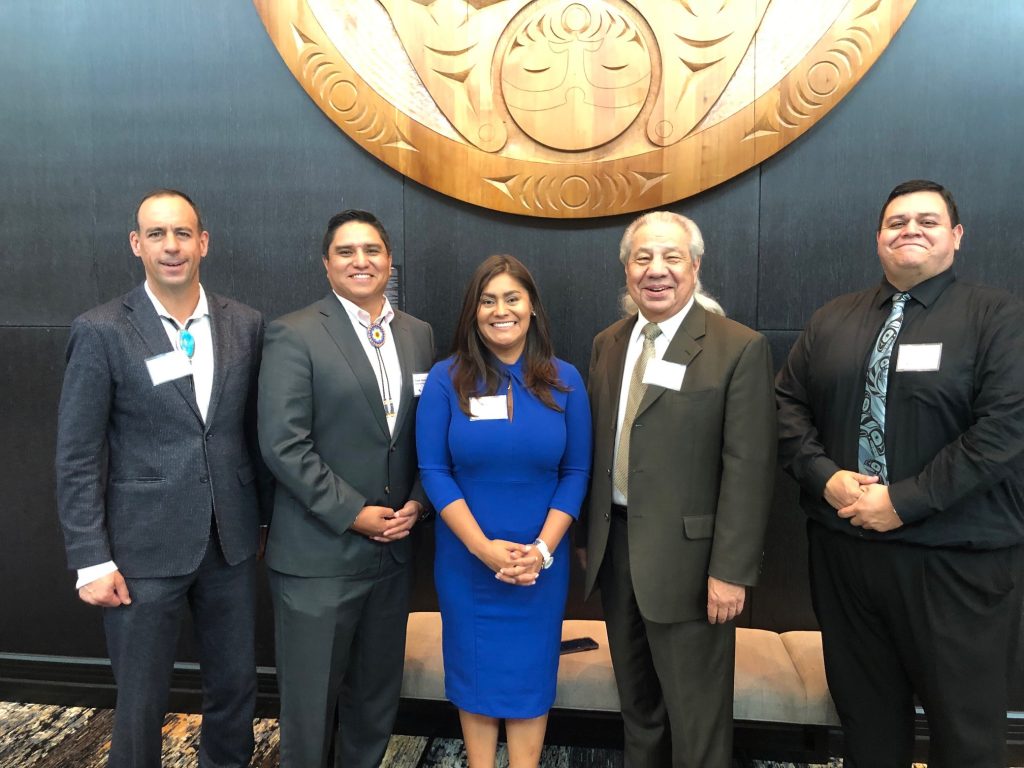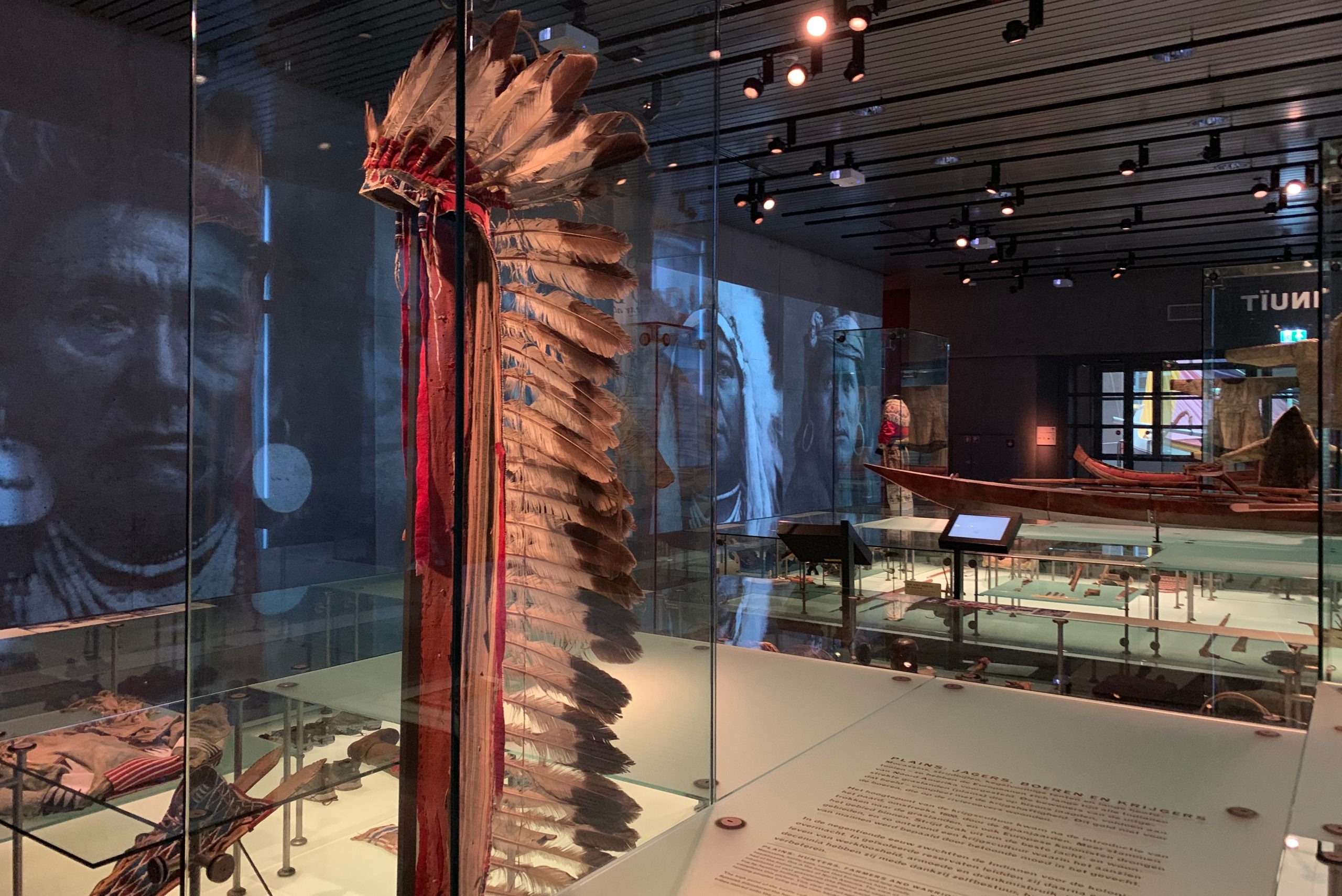In the mid-1970s, on a ski weekend in the Colorado Rockies, a chance meeting changed the course of Keystone Policy Center’s history. Ed Gabriel, then head of the Council of Energy Resource Tribes (CERT), met Bob Craig, founder of the Keystone Center. That conversation launched a relationship that would become one of Keystone’s most meaningful and enduring areas of work—partnering with tribal nations to advance sovereignty, foster collaboration, and build lasting solutions.
As we celebrate our 50th anniversary, we’re proud to reflect on that legacy and share how our tribal engagement work continues to shape the future.
Origins Rooted in Sovereignty
The 1970s were a time of transformation for tribal nations. The Indian Self-Determination Act had recently passed, and Native leaders across the country were asserting their sovereignty—not just politically or culturally, but economically. CERT was born from that spirit of self-determination, uniting 22 tribes to reclaim control of their mineral and energy resources.
Keystone’s model of non-adversarial dialogue and consensus-building resonated deeply with tribal leaders seeking new ways to engage with governments and industry.
“Bob Craig and Keystone really taught me about non-adversarial conflict resolution—how to bring people together and find consensus, how to develop trust across the table,” Gabriel recounted.
That foundation of trust helped tribes chart a new path forward, together.

Building from the Ground Up
From those early conversations emerged the Indian Business Roundtable, a space for tribal leaders and energy executives to learn from one another and explore new partnerships. What began as a meeting around mineral rights and water access soon expanded to broader discussions of policy, governance, and Indigenous self-determination.
John Echohawk, founder of the Native American Rights Fund and a key figure in this work, recalled how transformative the experience was.
“We put together the Indian Business Roundtable, sponsored by Keystone, to bring together the tribal leaders and the energy business leaders to get to know each other. We had a series of meetings that were very productive and informative for both sides—learning how to work together on these energy deals. It also helped the Keystone Policy Center realize that tribes were getting organized, exercising their sovereignty, and that they needed to be involved in those discussions.”
Keystone didn’t just facilitate those conversations—it evolved because of them. CERT’s pioneering leadership directly inspired Keystone’s broader energy program, a cornerstone of the organization’s work for decades. As Gabriel put it, “The Indian tribes gave a gift to Keystone.” That gift continues to ripple outward.
Embedding Engagement Across Our Work
Today, Keystone’s Center for Tribal and Indigenous Engagement carries this legacy forward. Led by Ernest House, Jr.—whose father was a founding member of CERT—the center is not a standalone initiative. It’s woven throughout all of Keystone’s work, from natural resources and education to governance, agriculture and community development.
This approach ensures that tribal perspectives are centered not only in tribal-specific work, but across every policy area we touch. Whether supporting local governments in building more authentic consultation processes, helping states engage respectfully with tribal nations on environmental and wildlife issues, or partnering on culturally responsive education initiatives, our work is grounded in trust, respect, and long-term relationships.

Each project reflects a core principle: tribal sovereignty isn’t a policy footnote. It is a fundamental lens through which we approach every decision, every partnership, every step forward.
A Vision for the Next 50 Years
Keystone’s role is not to lead for tribal nations, but to walk beside them—to support their vision, amplify their voices, and build the relationships that turn intention into action.
“Bob used to say we have to dare to fail. If we’re not out there trying to put heads together, we won’t know what’s possible,” said Gabriel.
That daring spirit remains at the heart of our mission.
As we look to the next 50 years, Keystone will continue to elevate Indigenous leadership, honor sovereignty, and cultivate the trust necessary for meaningful change. Our past is rooted in partnerships built on respect. Our future will be shaped by them.
Listen to our 50th anniversary podcast series examining this work below, including a powerful conversation between Ernest House, Jr. and Ed Gabriel reflecting on the beginnings of Keystone Policy Center’s work with tribal nations.


 Effective March 1, 2025, Thomas J. Vilsack, former United States Secretary of Agriculture and Governor of Iowa, became the first Chief Executive Officer for the World Food Prize Foundation. In this new role, Governor Vilsack is focusing on expanding the Foundation’s global network, and will further position the Foundation as a leader in addressing global food and nutrition insecurity, continuing his lifetime of public service.
Effective March 1, 2025, Thomas J. Vilsack, former United States Secretary of Agriculture and Governor of Iowa, became the first Chief Executive Officer for the World Food Prize Foundation. In this new role, Governor Vilsack is focusing on expanding the Foundation’s global network, and will further position the Foundation as a leader in addressing global food and nutrition insecurity, continuing his lifetime of public service. Shelby Coffey III is a distinguished journalist, media executive, and thought leader whose career has helped shape the landscape of American news and public discourse. Over several decades, Coffey has held some of the most influential roles in journalism, including serving as editor of the Los Angeles Times, executive vice president of ABC News, and deputy managing editor of The Washington Post. His editorial leadership extended to key roles as president of CNN Financial News, editor of the Dallas Times Herald, and U.S. News & World Report.
Shelby Coffey III is a distinguished journalist, media executive, and thought leader whose career has helped shape the landscape of American news and public discourse. Over several decades, Coffey has held some of the most influential roles in journalism, including serving as editor of the Los Angeles Times, executive vice president of ABC News, and deputy managing editor of The Washington Post. His editorial leadership extended to key roles as president of CNN Financial News, editor of the Dallas Times Herald, and U.S. News & World Report. Jerry Steiner has spent 40 years involved in agriculture following growing up on a Wisconsin dairy farm. He began his career with Monsanto, in multiple business leadership roles. From 2003-2013 he served as a member of the Executive team, as the company’s Executive Vice President of Sustainability and Corporate Affairs. He led the company’s global Government, Public and Industry Affairs teams across the 70 countries where Monsanto conducts business. This experience got Jerry connected to the Keystones centers work in agriculture. Key among his responsibilities were shaping the company’s public policy and building partnerships aimed at helping farmers around the world produce more food, while conserving valuable resources like water and energy. Two unique partnership that developed under his leadership were drought tolerant corn with 5 African countries, CIMMYT and the Gates foundation, and a building a sustainable business model in Brazil with the value chain leading to significant multi-company investment and soybean varieties that can protected themselves.
Jerry Steiner has spent 40 years involved in agriculture following growing up on a Wisconsin dairy farm. He began his career with Monsanto, in multiple business leadership roles. From 2003-2013 he served as a member of the Executive team, as the company’s Executive Vice President of Sustainability and Corporate Affairs. He led the company’s global Government, Public and Industry Affairs teams across the 70 countries where Monsanto conducts business. This experience got Jerry connected to the Keystones centers work in agriculture. Key among his responsibilities were shaping the company’s public policy and building partnerships aimed at helping farmers around the world produce more food, while conserving valuable resources like water and energy. Two unique partnership that developed under his leadership were drought tolerant corn with 5 African countries, CIMMYT and the Gates foundation, and a building a sustainable business model in Brazil with the value chain leading to significant multi-company investment and soybean varieties that can protected themselves. Jennifer Morris is the Chief Executive Officer of The Nature Conservancy, leading a team of nearly 6,000 staff working in more than 80 countries and territories tackling the dual crises of the
Jennifer Morris is the Chief Executive Officer of The Nature Conservancy, leading a team of nearly 6,000 staff working in more than 80 countries and territories tackling the dual crises of the  Congressman Joe Neguse represents Colorado’s 2nd District in the U.S. House of Representatives. He was elected to his first term in November 2018, becoming the first Black Member of Congress in Colorado history. In December 2022, Rep. Neguse was elected by his colleagues to serve as Chair of the Democratic Policy and Communications Committee (DPCC), becoming the first Coloradan to serve in a senior elected leadership role in the House in over 85 years. He serves on the Natural Resources and Judiciary Committees, and was also appointed by House Minority Leader Hakeem Jeffries to serve as one of four Democrats on the prestigious Rules Committee. Rep. Neguse serves as Ranking Member on the House Subcommittee on Federal Lands, which he previously Chaired in the 117th Congress.
Congressman Joe Neguse represents Colorado’s 2nd District in the U.S. House of Representatives. He was elected to his first term in November 2018, becoming the first Black Member of Congress in Colorado history. In December 2022, Rep. Neguse was elected by his colleagues to serve as Chair of the Democratic Policy and Communications Committee (DPCC), becoming the first Coloradan to serve in a senior elected leadership role in the House in over 85 years. He serves on the Natural Resources and Judiciary Committees, and was also appointed by House Minority Leader Hakeem Jeffries to serve as one of four Democrats on the prestigious Rules Committee. Rep. Neguse serves as Ranking Member on the House Subcommittee on Federal Lands, which he previously Chaired in the 117th Congress. Llewellyn King was born in Southern Rhodesia, now Zimbabwe. He went into journalism as soon as he turned 16, stringing for Time magazine and United Press in Africa.
Llewellyn King was born in Southern Rhodesia, now Zimbabwe. He went into journalism as soon as he turned 16, stringing for Time magazine and United Press in Africa. Steven Williams is the Chief Executive Officer of PepsiCo North America, overseeing a more than $48 billion business that spans PepsiCo’s Foods and Beverage operating units. His leadership encompasses more than 125,000 associates and over 900 locations across the U.S. and Canada. Steven joined PepsiCo in 2001 as part of PepsiCo’s acquisition of the Quaker Oats Company, which he joined in 1997, and has held leadership positions of increased responsibility since.
Steven Williams is the Chief Executive Officer of PepsiCo North America, overseeing a more than $48 billion business that spans PepsiCo’s Foods and Beverage operating units. His leadership encompasses more than 125,000 associates and over 900 locations across the U.S. and Canada. Steven joined PepsiCo in 2001 as part of PepsiCo’s acquisition of the Quaker Oats Company, which he joined in 1997, and has held leadership positions of increased responsibility since.